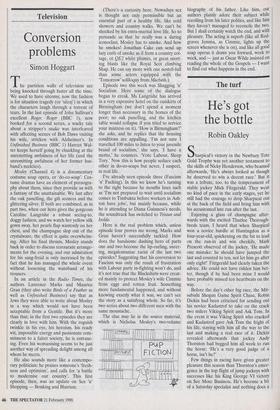Television
Conversion problems
Simon Hoggart
The partition walls of television are being knocked through faster all the time. We used to have sitcoms; now the fashion is for situation tragedy (or `sitrar) in which the characters laugh through a torrent of tears. In the last episode of John Sullivan's excellent Roger, Roger (BBC 1), now booked ,for a second series, a wacky tale about a stripper's snake was interleaved with affecting scenes of Bob Daws visiting his wife, stricken with Alzheimer's. In Unfinished Business (BBC 1) Harriet Wal- ter keeps herself going by chuckling at the unremitting awfulness of her life (and the unremitting awfulness of her former hus- band's neckties).
Mosley (Channel 4) is a documentary costume soap opera, or 'do-co-soap'. Cos- tume dramas have an element of pornogra- phy about them, since they provide us with a fantasy of the unattainable. We lust after the oak panelling, the gilt sconces and the glittering silver. If both are combined, as in part two, when our hero gives the gorgeous Caroline Langrishe a robust seeing-to, doggy fashion, and we watch her yellow silk gown sway, her pearls flap wantonly on her chest, and the champagne slop out of the crystalware, the effect is quite overwhelm- ing. After his final thrusts, Mosley stands back in order to discuss restaurant arrange- ments for the evening, and our admiration for his sang-froid is only increased by the fact that he has managed the whole event without loosening the waistband of his trousers.
In an article in the Radio Times, the authors Laurence Marks and Maurice Gran (they also write Birds of a Feather as well as Unfinished Business) say that as Jews they were able to write about Mosley in a way which would not have been acceptable from a Gentile. But it's more than that; in the first two episodes they are clearly in love with him. With the roguish twinkle in his eye, his heroism, his ready wit, impossible energy and passionate com- mitment to a fairer society, he is entranc- ing. Even his womanising seems to be just another way of spreading delight among all whom he meets.
He also sounds more like a contempo- rary politician: he praises someone's 'fresh- ness and optimism', and calls for 'a battle to modernise our country'. This first episode, then, was an update on Sex 'n' Shopping — Bonking and Blairism. (There's a curiosity here. Nowadays sex is thought not only permissible but an essential part of a healthy life, like cold showers and country walks. We can't be shocked by his extra-marital love life. So to persuade us that he really was a daring iconoclast, Mosley has to smoke. And how he smokes! Jonathan Cake can send up lazy curls of smoke as if from a country cot- tage, or QE2 white plumes, or great snort- ing blasts like the Royal Scot climbing Shap. He can say more with one nostril-full than some actors equipped with the `Tomorrow' soliloquy from Macbeth.) Episode two this week was Shagging 'n' Socialism. Here sonic of the dialogue began to creak. Ms Langrishe has arrived in a very expensive hotel on the outskirts of Birmingham (we don't spend a moment longer than necessary in the homes of the poor; no oak panelling, and the kitchen table would collapse if you tried to service your mistress on it). 'How is Birmingham?' she asks, and he replies that the housing conditions are appalling. 'I'm not sure I travelled 100 miles to listen to your juvenile brand of socialism,' she says. 'I have a motto,' he counters. 'Vote Labour, Sleep Tory.' Now this is how people seduce each other in do-co-soaps but never, I suspect, in real life.
I've already seen episode three (Fascism 'n' Fucking). In this we know he's turning to the right because he mouths lines such as 'I'm not prepared to wait until socialism comes to Timbuktu before workers in Ash- ton have jobs', but mainly because, while he is attending to Diana Guinness's needs, the soundtrack has switched to Tristan and Isolde.
Here is the real problem which, unless episode four proves me wrong, Marks and Gran haven't successfully tackled. How does the handsome dashing hero of parts one and two become the lip-curling, sneer- ing, megalomaniac racist of the last two episodes? Suggesting that his conversion to Fascism was only the result of frustration with Labour party in-fighting won't do, and it's not true that the Blackshirts were creat- ed mainly to protect Mosley's wife Cimmie from eggs and rotten fruit. Something more fundamental happened, and without knowing exactly what it was, we can't see the story as a satisfying whole. So far, it's two series about two different men with the same moustache.
The clue may lie in the source material, which is Nicholas Mosley's two-volume biography of his father. Like him, our authors plainly adore their subject while recoiling from his later politics, and like him they haven't managed to reconcile the two. But I shall certainly watch the end, and with pleasure. The acting is superb (like all Red- graves Jemma, as Cimmie, lights up the screen whenever she is on), and like all good soap operas it draws you forward, week to week, and just as Oscar Wilde insisted on reading the whole of the Gospels — I want to find out what happens in the end.


























































 Previous page
Previous page